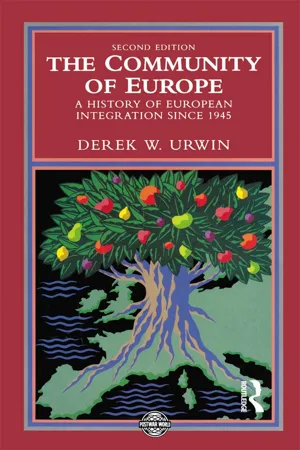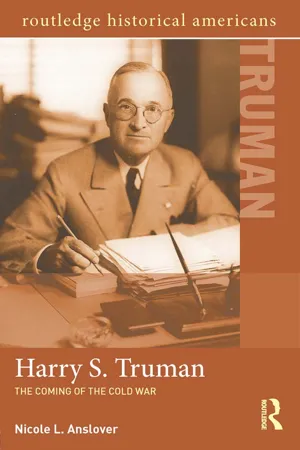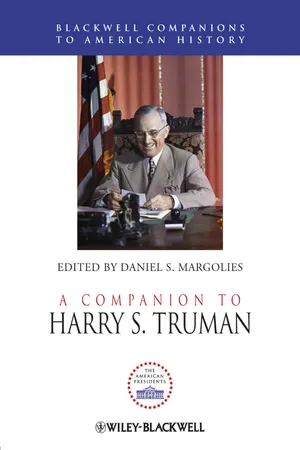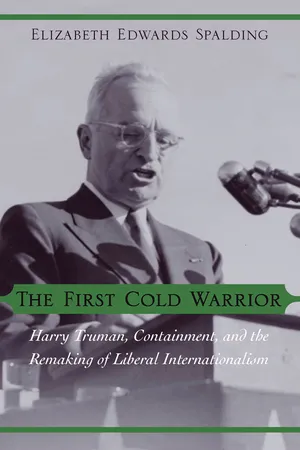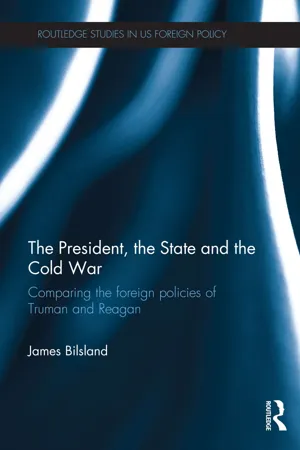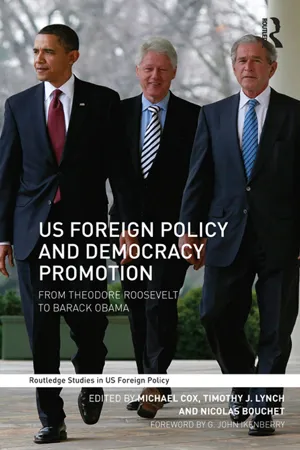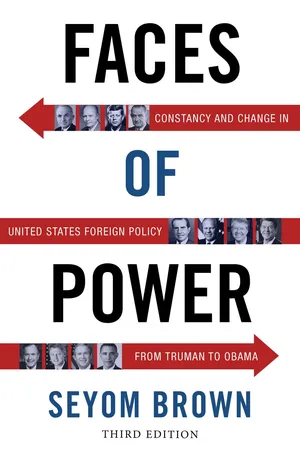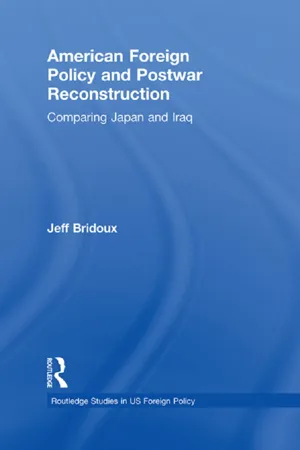History
Truman Doctrine
The Truman Doctrine was a foreign policy initiative announced by U.S. President Harry Truman in 1947. It aimed to contain the spread of communism by providing economic and military aid to countries threatened by communist expansion. This doctrine marked a significant shift in U.S. foreign policy, signaling a commitment to actively opposing the spread of communism globally.
Written by Perlego with AI-assistance
Related key terms
9 Key excerpts on "Truman Doctrine"
- eBook - ePub
The Community of Europe
A History of European Integration Since 1945
- Derek W. Urwin(Author)
- 2014(Publication Date)
- Routledge(Publisher)
The catalyst which may be said to have finally provoked America into positive political action was Communist activity in the Eastern Mediterranean, most specifically the attempt by Communist guerillas to seize control of Greece. Under the spheres of influence policy Greece had fallen within the British ambit. It soon became clear that British military support was the major prop of a weak Greek government. On the other hand, Britain was itself exhausted and incapable of diverting sufficient resources to bring the war to a speedy end. Early in 1947 an assessment of its own economic problems and its other overseas commitments led the Labour government to inform the United States that it could no longer fulfil its obligations in Greece no matter what the consequences might be. Since only the United States was capable of filling the vacuum that would be created by the British withdrawal, it had to accept responsibility for the area or risk seeing its influence and prestige in Europe suffer a damaging defeat.In March 1947 President Harry Truman outlined what was to be known as the Truman Doctrine. The American commitment to the governmental cause in Greece marked a fundamental re-evaluation of American foreign policy, most particularly in terms of its commitment to Western Europe. The Truman Doctrine was a pledge of American support for Tree peoples who are resisting subjugation by armed minorities or by outside pressures’. Stressing the interrelatedness of the democratic world, it emphasised that such subjugation did concern the United States, that world peace was necessary for American security. The Truman Doctrine marked the opening of a more aggressive phase in American foreign policy, giving it a new purpose and crusade. Its immediate target and beneficiary was Western Europe where hitherto, despite its words, the United States had been somewhat hesitant, even reluctant, to intervene.The most immediate consequence of the new American attitude was the despatch of military aid to Greece and the Eastern Mediterranean. More importantly, however, the Truman Doctrine was above all a pledge of a firm political relationship between the United States and Western Europe, one that was deeply welcome to the latter’s governments. But that relationship would be much better and the pledge of support more certain of success if the European democracies were themselves on a sound economic footing and able to contribute more decisively to their own defence. But the Truman Doctrine did not set out to do this. It was these factors, however, which contributed to the American announcement of the Marshall Plan later in 1947. While a plan for economic aid that was open to all European states, including the Soviet Union, the Marshall Plan was clearly politically as well as economically motivated: the United States must have taken into account that the offer would be rejected by Moscow and its satellites, as indeed it was. The Marshall Plan would be primarily something that more firmly linked Western Europe with the United States, and in so doing would also foster habits of closer collaboration. - eBook - ePub
Harry S. Truman
The Coming of the Cold War
- Nicole L. Anslover(Author)
- 2013(Publication Date)
- Routledge(Publisher)
Although Truman did not specifically blame the Soviet Union for this crisis, the next portion of his address made it perfectly clear that he was talking about the struggle between freedom-loving nations (the United States) and oppressors (the Soviet Union). Truman, speaking more passionately than usual, urged Congress to understand that the world was divided into two different ways of life. The way of life represented by America was “based upon the will of the majority, and is distinguished by free institutions, representative government, free elections, guarantees of individual liberty, freedom of speech and religion, and freedom from political oppression.” The contrasting way of life “is based upon the will of a minority forcibly imposed upon the majority. It relies upon terror and oppression, a controlled press and radio, fixed elections, and the suppression of personal freedoms.”After letting this information sink in, Truman reached the crux of his message. He forcefully stated: “I believe that it must be the policy of the United States to support free peoples who are resisting attempted subjugation by armed minorities or by outside pressures.” Although Truman only asked Congress to approve a bill that extended aid to Greece and Turkey, his point was well made. If the U.S. were to be part of a free world, it would have to do its part to help other nations remain free. He wanted the policy of the United States to be to assist nations resisting pressure, particularly from communism.28Congress passed the Greek-Turkish aid bill, and by doing so, approved the message presented by Truman. Quickly dubbed “The Truman Doctrine,” this speech was the foundation for his foreign policy. The cornerstone of that policy was containment—preventing the spread of communism at all costs. This policy was crucial in the formulation of American foreign policy for the next several decades, and several subsequent presidents used it as justification for American intervention in foreign lands. To the Soviet Union, the Truman Doctrine represented another chess move in the game they now played in these very early days of the Cold War. America now promised to defend the world against communism. The next move was up to the Soviets.Truman's message received an overwhelmingly favorable response. In his speech, he had reminded Congress that “The world is not static.”29 He, Harry Truman, was forging a foreign policy that responded to changing world events. And for the time being, people praised him for his foresight. The Greek government expressed its sincere thanks, and stated that Truman's bravery and wise advice were sure to prevent bloodshed.30 From London, the British government observed that Truman's speech was “the most heartening development in months” and expected that it would have a good effect on the ‘“‘primitive’ Soviet mentality.” Most of all, the British government appreciated Truman's frankness.31 The response from Paris was also favorable. There, the speech seemed a clear sign that the United States understood its new responsibilities and was willing to shoulder them. American prestige in Paris ran high.32 - eBook - ePub
- Daniel S. Margolies(Author)
- 2012(Publication Date)
- Wiley-Blackwell(Publisher)
Part V Truman's Foreign Policy Chapter Fifteen Great Britain and American Hegemony Kathleen Britt Rasmussen 1 On March 12, 1947, President Harry S. Truman told a specially convened joint session of Congress that Greece and Turkey needed help. Greece, mired in postwar economic dislocation, was besieged from within by a communist-led insurgency that challenged its “very existence,” while Turkey required a program of economic “modernization necessary for the maintenance of its national integrity.” It was of critical importance that they be stabilized through a massive infusion of economic aid, to the tune of $400 million, which the United States alone could provide. “The free peoples of the world look to us,” Truman declared, “for support in maintaining their freedoms. If we falter in our leadership, we may endanger the peace of the world – and we shall surely endanger the welfare of this Nation.” Thus did Harry Truman announce the seismic shift in U.S. foreign policy known as the Truman Doctrine, a commitment “to support free peoples who are resisting attempted subjugation by armed minorities or by outside pressures,” so as to help them “to work out their own destinies in their own way” (Truman, 1963: 177–80). The Truman Doctrine represented a pivotal moment in American history, signaling both a shift away from efforts to remain aloof from the upheavals of the European continent and the intensification of the Cold War containment of the Soviet Union. It was also indicative of another shift, one that had been in train for some time: the passing of the Pax Britannica into a Pax Americana. Buried deep within the text of Truman's address, amid the ringing calls for support of Greece and Turkey, were a scant few references to the United Kingdom, references that belied the central role that country had played in the coming of the Truman Doctrine - eBook - ePub
The First Cold Warrior
Harry Truman, Containment, and the Remaking of Liberal Internationalism
- Elizabeth Edwards Spalding(Author)
- 2006(Publication Date)
- The University Press of Kentucky(Publisher)
3“A growing feeling of certainty in the rightness of our step”
The Truman Doctrine
Scholars have long debated to what extent communism animated Soviet behavior during the Cold War. While controversy continues, extensive materials have been released from former Eastern bloc archives supporting the conclusion that Communist ideology typically motivated the Kremlin.1 Truman neither benefited from the academic debate nor was he privy to these materials. Instead, he drew on what he experienced and observed, and what information and analysis he received from his advisors. Some State Department officials interpreted the Soviet Union as a typical great power seeking hegemony, while others at State and within the armed service and intelligence sectors asserted the prominence of Communist ideology in Kremlin actions. As it became clear that the postwar world would be dominated by the East-West conflict rather than the United Nations, it became more common to refer to Soviet goals of territorial aggression and influence as being inspired by Communist Party totalitarianism. In 1946 and 1947, Truman received significant input—from the well-known Clifford memorandum to weekly ORE reports—to inform and support his views about the USSR.2 In forging a new liberal internationalism to buttress his Cold War foreign policy, Truman practiced executive-legislative cooperation in a way that had been notably rejected by Woodrow Wilson in the debate over the League of Nations and employed differently by FDR to gain backing for the fledgling United Nations. It was at this point in his presidency that Truman’s understanding of the war of nerves—as a total political battle with ideological, strategic, and economic elements—found its fullest expression in the Truman Doctrine of March 1947.Summer 1946
Europe’s economies remained shattered in 1946, and its peoples were defenseless against a conventional military attack. George Kennan and other specialists reported that Moscow viewed global capitalism as being in a period of crisis before its inevitable demise. To escalate that expected dissolution, the Soviets aimed to expand their reach in Germany, Trieste, and France. Red Army movements in eastern Germany in June prompted an immediate and major White House review. The USSR sought not only to speed the West’s decline but also to move against nations supposedly not in the capitalist camp, such as Iran, Turkey, Japan, and Korea. The Kremlin acted both on its own and through its new satellite states. In August at the Paris Peace Conference, Bulgaria demanded part of northern Greece, and the Soviet Union suggested a Kremlin trusteeship over either Libya or Eritrea. At the Montreux Convention, also in August 1946, the Soviets tried to renegotiate control of the Turkish Straits to include Soviet air and naval bases, a month after they proposed excluding all nations except for the Black Sea powers from the Dardanelles. More directly, Communists sponsored labor strikes in Iran and Iraq in July. The next month Yugoslavia made claims on Trieste and shot down two American transport aircraft on their regular routes from Austria to Italy. And twenty-five Red Army divisions, many of them motorized, massed on the southern border of the Caucasus, geared to exert pressure on Turkey and Iran. Throughout 1946, the Communists exploited unrest in Greece. Toward the year’s end, the Soviet Union tried to obtain naval bases in Norway and Iceland and succeeded in establishing one in Finland.3 - eBook - ePub
- James Bilsland(Author)
- 2015(Publication Date)
- Routledge(Publisher)
This section will analyse the role of Truman in formulating the Truman Doctrine. It begins with an overview of the situation facing US foreign policy makers in post-War Europe by focusing on the crisis prompted by events in Greece and Turkey. The reason for doing so is twofold. One, the birth of the Truman Doctrine represents a turning point in the history of US foreign policy, signalling a long-term strategic commitment to Western Europe. Two, it allows us to examine the role played by President Truman in its formulation. It will be shown that the US's decision to intervene was not inevitable, nor was the choice of policy. Instead, the birth of the Truman Doctrine allows us to investigate the importance of presidential worldview in US foreign policy. The key issue to stress is that Truman had choices to make, nothing was preordained. The US could have returned to isolationism, or restricted itself to simply funding Greece and Turkey. Why did Truman decide to enunciate a doctrine that committed the US to potentially long-term intervention outside of the Western Hemisphere for the first time in its history? Did the Truman Doctrine have to be framed in such terms? Answering these questions will allow us to show that presidential decision-making is central to explaining the development of US foreign policy at the outset of the Cold War.Greece and Turkey
On 21 February 1947 the British government sent two aide-memoires to the Department of State explaining that as a result of the financial burdens placed on the United Kingdom by the cost of the Second World War, they would no longer be able to continue their assistance to Greece and Turkey in their struggle against domestic leftist uprisings. The British would remove their 40,000 troops as soon as possible and would end military aid to both states. According to the British, if Greece and Turkey were not able to find support from other sources then it was likely that both countries would fall under control of communist forces loyal to the Soviet Union.32The decision by the British to pull out of Greece and Turkey had several results. First, it signalled to US policy-makers that Britain was no longer the major power in Europe and the Middle East. Dean Acheson stated bluntly, ‘The British are finished. They are through’.33 Second, along with most of the policy-makers in Washington, Acheson interpreted the crisis in Greece and Turkey as a deliberate ploy by the Soviet Union to seize control of two strategically important European and Middle-Eastern countries.34 The State Department had been monitoring the increasing political and economic instability in Greece for several months.35 As a result, Acheson knew that with the British gone only the US could contain the Soviet Union in the Eastern Mediterranean.36 Marshall assured the British Ambassador that the matter was of utmost importance and would be brought to the attention of President Truman as soon as possible.37 - eBook - ePub
US Foreign Policy and Democracy Promotion
From Theodore Roosevelt to Barack Obama
- Michael Cox, Timothy J. Lynch, Nicolas Bouchet(Authors)
- 2013(Publication Date)
- Routledge(Publisher)
In as much as the Soviets were seen as not only geopolitically expansionist, but also as seeking to expand their influence by installing communist regimes under their own control, so Truman’s commitment to democracy came to merge with his anti-communism to produce what came to be the classic Cold War binary mindset that identified all anti-communist forces as ‘free’, and to see ‘free’ and ‘democratic’ as synonymous. 13 The Truman Doctrine Gradual development of this merging of Truman’s attitudes – or, to put it another way, the distortion of his commitment to democratic values, or at least the overlaying of it with the imperatives of anti-communism – took place throughout 1946 to reach a culmination in the Truman Doctrine of 12 March 1947. It is worth noting, however, that Truman did not entirely submerge the contradiction within these attitudes, and showed through the rest of his presidency periodic signs of discomfort with the implications, notably with regard to the domestic anti-communism that he somewhat thoughtlessly unleashed. That notwithstanding, the Truman Doctrine speech stands as an undisputed landmark in the history of American engagement in world affairs and set down a clear, and as it turned out, irreversible, commitment to the idea of American intervention on the side of democracy. Moreover, democracy was defined a certain way: as a default position for nations and peoples that had not fallen under totalitarianism. Truman outlined how American aid to help solve Greece’s economic problems was linked to its political future; aid would directly promote democracy, which was threatened by external and internal subversive forces: Greece must have assistance if it is to become a self-supporting and self-respecting democracy. … There is no other country to which democratic Greece can turn - eBook - ePub
The Dangerous Doctrine
National Security And U.s. Foreign Policy
- Saul Landau(Author)
- 2019(Publication Date)
- Routledge(Publisher)
The American Century embodied the unstated implication that the United States would become the arbiter of political and economic systems in the rest of the world. Unlike most previous empires, the United States had no worthy rivals. Indeed, its leaders presumed that they could decide the world's fate. The problem was to figure out a way simultaneously to control U.S. society without appearing to make apparent alterations in its political and social forms.The men who made global decisions based their world vision on a concept of U.S. national security that Dean Acheson succinctly summarized in 1947: "We are willing to help people who believe the way we do, to continue to live the way they want to live."12 Domestically, national security required continuation of wartime bipartisan consensus to eliminate debate on such basic issues as budget allocations for "defense" and the means and ends of foreign policy.The Truman Doctrine, invoked to "save" Iran, Greece, and Turkey, became the operating global national security policy in the cold war era. The United States, the doctrine declared, had the right to intervene in order to save entire regions from communist subversion. From the Mediterranean in the late 1940s, to Southeast Asia in the 1960s, to Central America in the 1980s, the word "save," while used in terms of combating Soviet influence, actually has meant preventing indigenous independence movements from taking their countries out of the U.S. orbit.In March 1947, President Truman delivered a speech to Congress that announced publicly what already had secretly become U.S. policy.13 In asking for aid to Greece, the president declared: "I believe that it must be a policy of the United States to support free peoples who are resisting attempted subjugation by armed minorities or by outside pressures."14 Ironically, some of the Greek recipients of U.S. aid had collaborated with the Nazis just two years before, and the foes of U.S. national security had composed the heart of the Greek resistance to the Axis. The Soviets, supposedly intent on world domination, became sufficiently intimidated by the very announcement of Truman's doctrine to abandon their Greek comrades by cutting off their supplies.15 - eBook - ePub
Faces of Power
Constancy and Change in United States Foreign Policy from Truman to Obama
- Seyom Brown(Author)
- 2015(Publication Date)
- Columbia University Press(Publisher)
a. That the United States approach to world problems is a defensive reaction to Communist pressure and that the effort to restore sound economic conditions in the other countries is only the by-product of this reaction and not something we would be interested in doing if there were no Communist menace.b. That the Truman Doctrine is a blank check to give economic and military aid to any area of the world where Communists show signs of being successful. It must be made clear that the extension of American aid is essentially a question of political economy in the literal sense of the term and that such aid will be considered only in cases where the prospective results bear a satisfactory relationship to the expenditure of American resources and effort.35Secretary of State Marshall heeded this advice. Launching the program for European recovery at Cambridge on June 5, 1947, he claimed, “Our policy is directed not against any country or doctrine but against hunger, poverty, desperation and chaos.” And the offer to join in the cooperative effort was made to all European nations.36 Under Secretary of State Acheson worried that the Kremlin would have its East European satraps participate in order to sabotage it. But Marshall did not want the United States to be the one to be blamed for closing the curtain between Eastern and Western Europe. Although the offer was genuine, many in the United States government and Western Europe were relieved when—as Kennan had predicted—Stalin prevented the Eastern European states from joining the effort.37Marshall had a multifaceted view of the balance of power considerations: he believed that the revival of Western European economic vigor, which was based in large measure on manufacturing, would have been facilitated by the raw material resources that once again could be tapped in the Eastern European areas. Eastern Europe in turn could provide a market for the West’s manufactured goods. To maintain an advantageous balance of power against the Soviet Union, the West needed a strong Western Europe; it did not require an unhealthy Eastern Europe. Moreover, there were some in the United States government who felt that an Eastern Europe largely dependent for its own well-being upon economic relations with the West would be less subject to total Soviet control.38 - Jeff Bridoux(Author)
- 2013(Publication Date)
- Routledge(Publisher)
Chapters 2 ). The 1947 Truman Doctrine, while not actively asserting an American right and duty to preventive coercion, promoted an American right to support countries whose autonomy was threatened by communist expansionism. The survival of the American economic and political systems were identified as depending on their expansion abroad, continuing a movement in motion since the founding of the Republic, of which Washington was, and still is, the kinetic centre.Similarly, in the nineties, victorious in the Cold War, America engaged with the world primarily through a mix of multilateralism, and limited its coercive actions to preserving its interests where necessary; as the First Gulf War and a policy of active containment through a punitive sanctions regime and aerial attacks, taming Saddam Hussein’s ambitions in the Middle East, illustrate.3 Under Clinton, interventions were mainly justified by humanitarian motives or by the impotence of other powers, as in Somalia in 1993 and in the Balkans in the mid-nineties.4 The post-Cold War period witnessed triumphant Liberalism as the basis for the making of a new world order, propelling some observers to proclaim the end of history (Fukuyama 1992).5 However, the accession of G.W. Bush to the White House, followed by the attacks of 9/11, magnified the coercive aspects of American foreign policy, discarding existing international agreements in favour of ad hoc coalitions of allies ready to follow US leadership. The Bush Doctrine completed the US foreign policy evolution with an emphasis on American security and the necessity to strike first to dispose of immediate or long-term menaces. Facing the deadly combination of WMD and terrorist groups willing to use them, G.W. Bush identified the active promotion of political and economic freedom on a global scale as the best way to protect the United States. Thus, America pursued assertively her perennial quest to preserve her global supremacy by spreading an ideology built on capitalism as mode of production and political liberalism as coagulant for those willing to join in, echoing the Neo-Gramscian claim of transnational Gramscian historical bloc linking capitalist elites across the globe.6
Learn about this page
Index pages curate the most relevant extracts from our library of academic textbooks. They’ve been created using an in-house natural language model (NLM), each adding context and meaning to key research topics.
